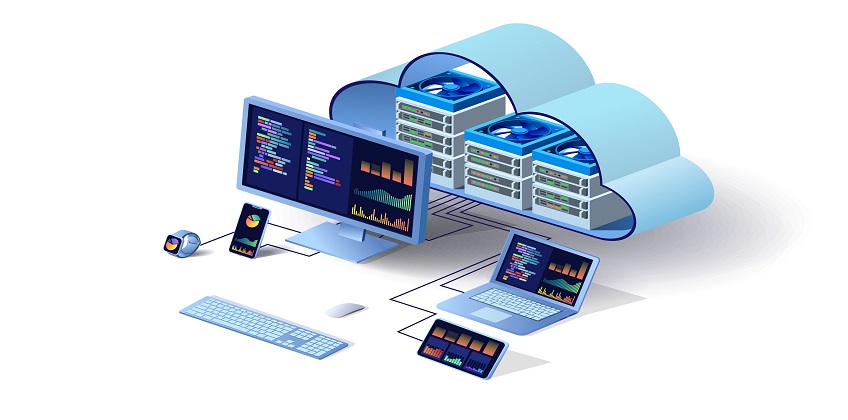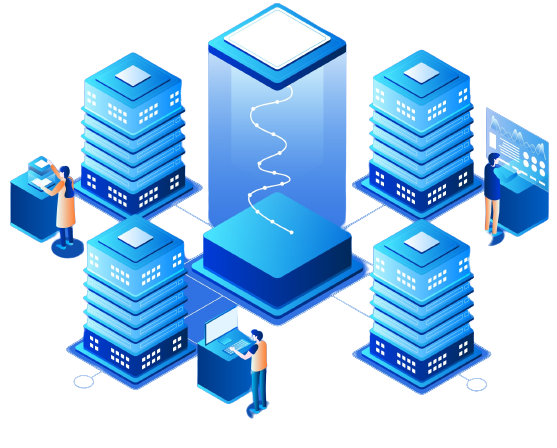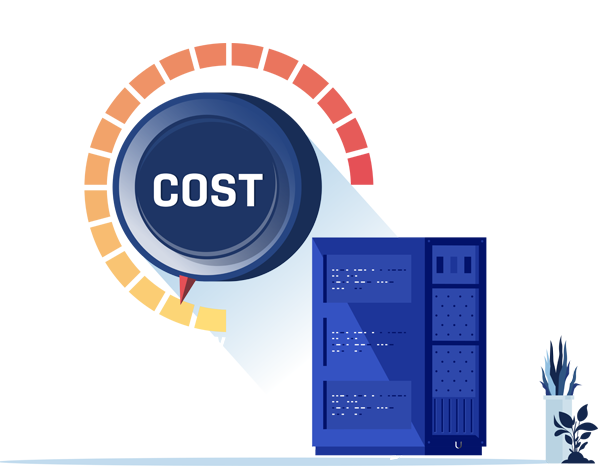A dedicated server is a type of web hosting service where an entire physical server is exclusively leased or allocated to a single client or organization. Unlike shared hosting or virtual private servers (VPS), where multiple users share the same server resources, a dedicated server provides the user with complete control and exclusive access to all the server’s resources. This isolation allows for higher performance, greater customization, and enhanced security.
Dedicated servers provide high performance because all the server resources (CPU, RAM, storage, bandwidth) are exclusively dedicated to a single user or organization. This ensures consistent and reliable performance, especially for resource-intensive applications and websites.

Dedicated servers enhance security because there are no other users sharing the same physical server. This isolation minimizes the risk of security vulnerabilities stemming from neighboring accounts. Users have greater control over security measures and can implement specific configurations to meet their security requirements.
Dedicated servers are better equipped to handle sudden increases in traffic. This is crucial for websites and applications that experience periodic spikes in activity, such as during marketing campaigns or special events.
Here are key aspects of dedicated servers:

Exclusive Resources:
Exclusive resources in dedicated servers refer to the fact that all the computing resources of a physical server are allocated to a single user or organization. Unlike shared hosting or virtual private servers (VPS), where multiple users share the same server, a dedicated server ensures that the CPU, RAM, storage, and bandwidth are exclusively dedicated to the needs of one user.

- CPU (Central Processing Unit):
- The entire processing power of the CPU is dedicated to the user’s applications and processes. This ensures that the user has full control over the CPU’s capabilities and doesn’t have to compete with other users for processing resources.
- RAM (Random Access Memory):
- The entire RAM capacity of the server is reserved for the user. This exclusive access to RAM is crucial for applications that require a large amount of memory for optimal performance. It eliminates the risk of insufficient memory due to activities of other users.
- Storage:
- The dedicated server user has exclusive access to the server’s storage capacity. This includes hard drives or solid-state drives (SSDs) where data, applications, and the operating system are stored. Users can configure the storage setup based on their specific needs.
- Bandwidth:
- The available bandwidth for data transfer is dedicated solely to the user. This is particularly important for websites or applications with high traffic volumes, ensuring that the user has the full capacity of the server’s network connection.
The concept of exclusive resources is significant for performance-sensitive applications and websites. It means that the user doesn’t have to contend with other users for resources, resulting in more predictable and consistent performance. This is particularly beneficial for scenarios where there are high traffic loads, resource-intensive applications, or strict performance requirements.
Complete Control:
Dedicated servers refers to the level of administrative access and autonomy that users have over the server. Unlike shared hosting or virtual private servers (VPS), where certain administrative tasks and configurations may be restricted, dedicated servers provide users with full control over the server environment. Here are key aspects of the complete control offered by dedicated servers:

- Administrative Access:
- Users of dedicated servers typically have root access (for Linux-based systems) or administrative access (for Windows-based systems). This elevated access level allows users to make changes at the system level, install and configure software, and perform administrative tasks.
- Operating System Selection:
- Users can choose the operating system that best suits their requirements. Whether it’s Linux distributions (such as CentOS, Ubuntu, or Debian) or Windows Server editions, users have the freedom to install and configure the OS of their choice.
- Software Installation and Configuration:
- Dedicated server users can install and configure software applications based on their specific needs. This includes web servers (like Apache or Nginx), databases (such as MySQL or PostgreSQL), programming languages, and any other software required for their applications.
- Server Customization:
- Users have the flexibility to customize server settings, adjust configurations, and optimize performance parameters. This level of customization is essential for tailoring the server environment to the unique requirements of the hosted applications.
- Security Measures:
- With complete control, users can implement their own security measures and configurations. This includes setting up firewalls, configuring access controls, and managing security updates. Users have the autonomy to implement security best practices based on their specific security requirements.
- Resource Allocation:
- Users can control how resources such as CPU, RAM, and storage are allocated within the server. This allows for optimization based on the demands of the hosted applications, ensuring that resources are utilized efficiently.
- Backup and Recovery:
- Users can implement their own backup and recovery strategies. This includes scheduling backups, choosing backup storage locations, and configuring recovery processes. Complete control over these aspects ensures that users can tailor backup solutions to meet their specific needs.
- Server Monitoring and Logging:
- Dedicated server users can implement monitoring tools and configure logging to track server performance, diagnose issues, and generate reports. This level of control is crucial for proactive server management and troubleshooting.
Customization:
Customization in dedicated servers refers to the ability of users to tailor and configure various aspects of the server environment based on their specific needs and requirements. Dedicated servers offer a high degree of customization compared to shared hosting or virtual private servers (VPS). Here are key areas of customization in dedicated servers:

- Operating System Selection:
- Users have the freedom to choose the operating system that best suits their preferences and application requirements. This includes various Linux distributions (e.g., CentOS, Ubuntu, Debian) or Windows Server editions.
- Software Installation:
- Users can install and configure software applications according to their needs. This includes web servers (e.g., Apache, Nginx), databases (e.g., MySQL, PostgreSQL), content management systems (e.g., WordPress), programming languages, and any other software components required for their applications.
- Server Configurations:
- Dedicated server users have control over server configurations, including settings related to performance, security, and networking. This customization allows users to optimize the server environment for their specific workloads.
- Security Measures:
- Users can implement customized security measures to protect their server and applications. This may include configuring firewalls, setting up intrusion detection systems, implementing SSL certificates, and managing access controls.
- Resource Allocation:
- Users can allocate resources such as CPU, RAM, and storage based on the requirements of their applications. This flexibility ensures that resources are distributed efficiently, optimizing performance for specific workloads.
- Backup and Recovery Strategies:
- Dedicated server users can customize backup and recovery strategies according to their data protection needs. This includes scheduling backups, choosing backup storage locations, and defining retention policies for backup data.
- Monitoring and Logging:
- Users can customize server monitoring and logging configurations to track system performance, detect issues, and generate detailed reports. Customized monitoring setups allow users to proactively manage and troubleshoot server-related issues.
- Virtualization and Containerization:
- For users leveraging virtualization or containerization technologies, dedicated servers provide the flexibility to customize these environments. Users can configure virtual machines or containers to meet specific application requirements.
- DNS Configuration:
- Users have control over Domain Name System (DNS) configurations, allowing them to manage domain names, set up subdomains, and control how DNS resolves for their hosted services.
- Load Balancing and Scaling:
- Users can implement customized load balancing and scaling solutions to distribute traffic and ensure high availability for their applications. This is particularly important for websites and applications with varying levels of traffic.
- Mail Server Configuration:
- Users can set up and configure mail servers according to their email communication needs. This includes managing email accounts, configuring mail protocols (e.g., SMTP, IMAP), and implementing security measures.
Performance:
Performance is a key benefit of dedicated servers, and several factors contribute to their ability to deliver high levels of performance:

- Exclusive Resources:
- In a dedicated server environment, all computing resources, including CPU, RAM, storage, and bandwidth, are exclusively allocated to a single user or organization. This exclusivity ensures that the user has full access to the server’s capabilities without sharing resources with other users, leading to more consistent and reliable performance.
- High Processing Power:
- Dedicated servers typically come with powerful CPUs that can handle demanding computing tasks. This is essential for applications and websites with high processing requirements, such as complex calculations, database operations, or multimedia processing.
- Customizable Hardware:
- Users have the flexibility to choose and customize the hardware specifications of their dedicated server. This includes selecting the type and capacity of CPUs, the amount of RAM, and the type of storage (HDDs or SSDs). This customization allows users to tailor the server to meet the specific performance needs of their applications.
- Optimized Software Environment:
- Users have control over the server’s software environment, including the choice of the operating system and the installation of specific software and configurations. Optimizing the software environment ensures that applications run efficiently and take full advantage of the available hardware resources.
- Predictable Resource Availability:
- With exclusive access to resources, users can predict and manage resource availability more effectively. This is crucial for applications that require consistent performance levels, especially during periods of high traffic or resource-intensive tasks.
- Network Performance:
- Dedicated servers often come with high-speed and dedicated network connections. This ensures fast data transfer rates and low latency, contributing to improved website loading times and responsive application performance.
- Scalability:
- Many dedicated server hosting providers offer scalable solutions, allowing users to easily upgrade or downgrade resources based on changing performance requirements. This scalability ensures that the server can adapt to the evolving needs of the user’s applications.
- Isolation from Other Users:
- The isolation provided by a dedicated server means that the user’s performance is not impacted by the activities of other users sharing the same server. This is in contrast to shared hosting environments where resource contention can lead to performance bottlenecks.
- Customized Resource Allocation:
- Users can allocate resources based on the specific needs of their applications. Whether it’s assigning more CPU power, increasing RAM, or optimizing storage configurations, customization allows users to fine-tune resource allocation for optimal performance.
- Reliability:
- The reliability of dedicated servers contributes to consistent performance. Users can rely on the dedicated resources and the stability of the server environment to ensure that their applications and websites are consistently available to users.
Security:
Security is a critical aspect of dedicated server hosting, and several features contribute to the enhanced security of dedicated servers:

- Isolation:
- Dedicated servers provide a high level of isolation since all resources are dedicated to a single user or organization. This isolation minimizes the risk of security vulnerabilities that can arise in shared hosting environments where multiple users share the same server.
- Exclusive Access:
- Users of dedicated servers have exclusive access to the server’s resources, including the operating system, applications, and configuration settings. This exclusivity allows users to implement security measures specific to their needs and preferences.
- Custom Security Configurations:
- Users have the flexibility to customize security configurations based on their specific requirements. This includes setting up firewalls, configuring access controls, and implementing security protocols that align with the user’s security policies.
- Operating System Security:
- Dedicated server users can choose the operating system and implement security best practices for that specific OS. Regular security updates, patches, and proper configuration help to mitigate vulnerabilities and enhance overall server security.
- Data Privacy:
- The exclusive nature of dedicated servers ensures that sensitive data is not shared with other users. This is crucial for businesses and organizations that handle sensitive customer information, financial data, or proprietary information.
- Control over Software Installation:
- Users have control over the installation and configuration of software on the server. This includes web servers, databases, content management systems, and other applications. By managing the software stack, users can reduce potential security risks associated with unnecessary or outdated software.
- Security Patching:
- Users are responsible for applying security patches and updates to the server’s operating system and software. This proactive approach helps to address known vulnerabilities and keeps the server protected against potential security threats.
- Physical Security:
- Dedicated servers are physically located in data centers with controlled access, security measures, and monitoring. This physical security helps protect the server hardware from unauthorized access, theft, or tampering.
- Network Security:
- Dedicated servers often come with dedicated and secure network connections. Users can implement network security measures such as intrusion detection systems, firewalls, and Virtual Private Networks (VPNs) to safeguard data during transmission.
- Secure Remote Access:
- Users can control and secure remote access to the dedicated server through secure protocols like SSH (Secure Shell) for Linux-based servers or RDP (Remote Desktop Protocol) for Windows-based servers. This ensures that only authorized users can access the server remotely.
- Monitoring and Auditing:
- Implementing monitoring tools and auditing mechanisms helps users track server activity, identify potential security incidents, and generate logs for analysis. Regular monitoring contributes to the early detection of security issues.
Cost:
Dedicated servers are generally more expensive than shared hosting or VPS solutions due to the exclusive access to resources. However, the cost is justified for businesses or individuals requiring high performance, customization, and control.

The cost of a dedicated server can vary significantly based on several factors, including the hosting provider, server specifications, additional features, and the level of support provided.
- Hosting Provider:
- Different hosting providers offer dedicated server plans with varying pricing structures. Established and reputable hosting providers may charge higher prices for their services, reflecting the quality of infrastructure, support, and additional features.
- Server Specifications:
- The hardware specifications of the dedicated server, including the type and number of CPUs, amount of RAM, storage capacity (HDD or SSD), and bandwidth allocation, significantly impact the cost. Higher-performing servers with more resources generally come with higher prices.
- Managed vs. Unmanaged Services:
- Managed dedicated servers, where the hosting provider takes care of server management tasks, monitoring, and security, typically cost more than unmanaged servers. Unmanaged servers require users to handle these aspects themselves.
- Data Center Location:
- The physical location of the data center where the dedicated server is hosted can affect the cost. Data centers in prime locations with advanced infrastructure and high connectivity may have higher operating costs, influencing the overall server pricing.
- Additional Features:
- Some hosting providers offer additional features such as backup services, DDoS protection, dedicated IP addresses, and SSL certificates. These add-ons can contribute to the overall cost of the dedicated server.
- Contract Length:
- The length of the hosting contract can influence the pricing. Providers may offer discounts for longer-term commitments, such as annual or multi-year contracts.
- Scalability Options:
- Dedicated server plans with scalable resources, allowing users to easily upgrade or downgrade their server specifications, may have different pricing tiers based on the level of scalability provided.
- Support Level:
- The level of support offered by the hosting provider, ranging from basic support to fully managed services with 24/7 technical support, can affect the cost. Higher levels of support typically come with higher prices.
- Operating System Licensing:
- If the hosting provider includes a licensed operating system with the dedicated server, it can impact the cost. Some providers may offer a choice of operating systems, each with its associated licensing fees.
- Customization Options:
- Customization options, such as the ability to choose specific hardware components, add more storage, or install custom software, may contribute to the overall cost of the dedicated server.
In choosing a dedicated server, users should carefully consider their specific requirements, budget, and technical expertise. It’s essential to select a reputable hosting provider, understand the terms of service, and explore additional features and support options. Overall, dedicated servers are a powerful solution for those seeking a high-performance and highly customizable hosting environment.
